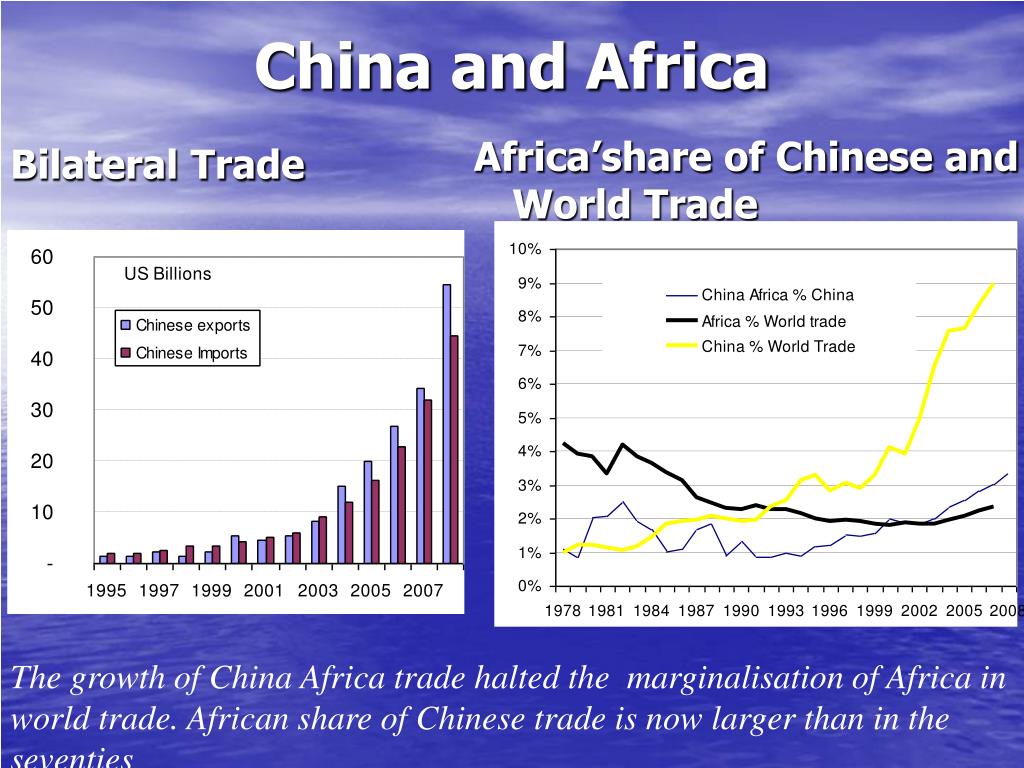As global economies intertwine, the burgeoning trade partnership between China and Africa has emerged as a transformative force, fostering economic growth, infrastructure development, and shared prosperity across the continent. With a shared history of cooperation and a mutual commitment to sustainable development, this vibrant trade exchange is reshaping the economic landscape of Africa, offering unprecedented opportunities for both partners.

Image: conpats.blogspot.com
China’s engagement with Africa can be traced back to the 1960s, but it gained significant momentum in the early 21st century. Since then, trade volumes have skyrocketed, with China becoming Africa’s largest trading partner by 2009. This surge in trade has been driven by Africa’s abundant natural resources, including oil, minerals, and agricultural products, which China needs to fuel its rapidly expanding economy. In return, China exports a wide range of manufactured goods, from electronics to infrastructure equipment, to Africa, contributing to the continent’s development and modernization.
Economic Empowerment and Industrialization
One of the most significant benefits of China-Africa trade has been the economic empowerment it has brought to the continent. China’s demand for African resources has led to increased investment in these sectors, creating jobs, developing infrastructure, and boosting local economies. This has fostered economic diversification, reducing Africa’s reliance on traditional exports and creating new avenues for sustainable growth.
Furthermore, China’s transfer of technology and expertise has played a crucial role in promoting industrialization in Africa. Chinese companies have invested heavily in manufacturing facilities, sharing knowledge and skills with local workforces. This has not only boosted productivity and competitiveness but has also laid the foundation for Africa to develop its own industrial base, reducing its dependence on imported goods and creating a virtuous cycle of economic growth.
Infrastructure Development and Connectivity
China’s involvement in Africa has had a transformative impact on the continent’s infrastructure. Chinese companies have undertaken major infrastructure projects, including roads, railways, ports, and energy facilities. These projects have improved connectivity, reduced transportation costs, and opened up new economic opportunities for African countries.
For example, the Mombasa-Nairobi Standard Gauge Railway, built by a Chinese consortium, has significantly reduced travel time between the two cities, boosting trade and tourism in Kenya and the broader East African region. Similarly, the Addis Ababa-Djibouti Railway has transformed landlocked Ethiopia’s access to international markets, spurring economic growth and development.
Social Progress and Shared Prosperity
Beyond its economic benefits, China-Africa trade has also contributed to social progress and shared prosperity on the continent. Chinese involvement in Africa has created employment opportunities, improved access to healthcare and education, and supported local communities.
China’s commitment to corporate social responsibility has led many Chinese companies to invest in social projects in Africa. These initiatives range from building schools and hospitals to providing medical assistance and training local healthcare professionals. Such investments have played a significant role in improving the lives of ordinary Africans.

Image: www.slideserve.com
Navigating Challenges and Seizing Opportunities
While the China-Africa trade partnership has brought immense benefits, it is not without its challenges. Concerns have been raised about the sustainability of Africa’s natural resources, the potential for debt accumulation, and fair labor practices. It is crucial for African countries to carefully manage these challenges, ensuring that trade benefits all parties involved and promotes long-term, sustainable development.
To reap the full potential of China-Africa trade, African countries need to develop coherent trade strategies, diversify their economies, and strengthen their negotiating power. They should also prioritize value addition, processing their raw materials within Africa to create jobs and generate higher returns. By working together, China and Africa can address these challenges, seize opportunities, and create a future of shared prosperity and mutual benefit.
China Africa Trade
Conclusion
The China-Africa trade partnership is a testament to the power of cooperation and shared commitment to development. By fostering economic growth, infrastructure development, and social progress, this partnership is reshaping the future of Africa. However, it is essential to navigate challenges and seize opportunities carefully to ensure the long-term sustainability and mutual benefits of this dynamic partnership.
As Africa and China continue to work together, they have the potential to create an even brighter, more prosperous, and interconnected future for both continents.






